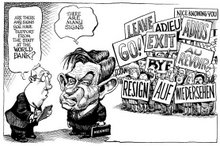Canada Comes Out of the Closet
WASHINGTON (Reuters) May 15 2007 - The US failed to win the support of key allies in the Group of Seven over World Bank President Paul Wolfowitz's leadership, with only Japan standing by Washington, a bank board source said Tuesday.
"Japan was aligned with the United States, but others, including Canada, were against Wolfowitz continuing," the European source told Reuters, following a conference call of G7 officials. The G7 comprises the United States, Japan, Canada, Italy, France, Germany and Britain.



2 comments:
Open Letter To:
The Hon. Koji Omi
Minister of Finance
The Hon. Taro Aso
Minister of Foreign Affairs
Dear Mr Omi and Aso
It has been over 60 years since World War II ended. Three generations have now grown up since the ruinous war that resulted in Japan's defeat and the unusual status of having a constitution that prohibited offensive forces.
Japan, while possessing a large 'Self-Defense Force', is unable to fully function as a member of the international community under this constitution.
Hence, Japan tries to 'make up' by making other contributions like outsized financial contributions to international organizations.
Japan has a longstanding goal to become seated as a member of the UN security council and in the past decades, have expended considerable political and economic capital toward that goal.
While Japan's aspirations to put the past behind it and become a normal country are opposed by some nations, there is a compelling need by the international community to, no matter how difficult, forgive and forget Japan's past and welcome Japan's increased participation by carrying the burden of international governance.
From the standpoint of the international community, Japan has been a valuable financial contributor to multilateral organizations and certainly merits a status and stature concomitant with its contributions.
However, in order for Japan to be truly recognized as a legitimate member of the international community, it has to be seen as upholding the highest standards of international governance in the organizations it participates in like the World Bank Group.
Indeed, Japan's record in responsible governance is a necessary condition for the international community to accede to Japan playing a larger role in areas like global security.
However, Japan's recent behavior in the "Rizagate" scandal at the World Bank have raised fresh questions about the maturity and suitability of Japan's international citizenship.
After the release of the Ad Hoc Group's report yesterday, there cannot be any doubt that the behavior of Paul Wolfowitz during the Rizagate scandal and his subsequent behavior during the investigation has damaged the World Bank Group.
Wolfowitz has also demonstrated no remorse, refused to accept any responsibility, or put forward no credible plan to restore the World Bank Group's credibility and stature in the development community.
Japan, as the second largest shareholder of the Bank, have substantial interests in the integrity of the institution.
Yet, for whatever reason, Japan has elected to maintain its support for Wolfowitz despite compelling evidence that his leadership has harmed, and will continue to harm the Bank.
Loyalty to allies, especially crucial ones like the United States, is a laudable trait, and therefore, Japan's stance can be understandable up to a point.
However, those who are truly loyal subjects of the Emperor, or King, sometimes have to disagree with the powers that be regardless of the short term consequences to the relationship.
If Japan is truly loyal to the United States, Japan must be occasionally bold enough to tell the Emperor what is best for them.
Do you think it might be possible for Japan to summon up the courage to do the right thing at the World Bank?
Sincerely,
Doctor No
This one's good:
http://www.guardian.co.uk/imf/story/0,,2080544,00.html
Post a Comment